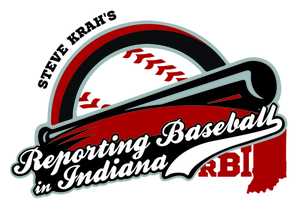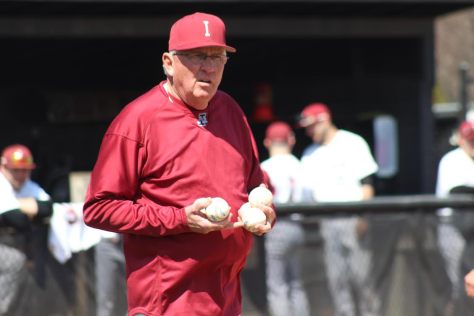
By STEVE KRAH
The American Baseball Coaches Association will stage its 75th annual convention Jan. 3-6, 2019 in Dallas. Outgoing ABCA president Rich Maloney will be there to lead off the event.
The Ball State University head baseball coach has served the ABCA in various capacities, including his time on the executive committee. He was fourth, third, second and first vice president prior to his year as president.
Prior to that, he was NCAA Division I baseball committee chairman for six years.
“It’s a journey, honor and a privilege,” says Maloney, who heads into his 24th season as a head coach, including his 14th at BSU, in 2019. “The goal of the ABCA is to enhance baseball at all levels.”
Maloney has gotten a chance to rub shoulders with some of the most accomplished coaches in the country.
“These guys have grown the game and they did it for the love of the game,” says Maloney. 54. “When they started there wasn’t very much money in the game.
“It’s very meaningful. These guys just care about the future of baseball.”
Continuing as a board of directors member, Maloney will have the chance to be part of a body that serves as the “voice” of college baseball.
Maloney, who got his coaching start as a Western Michigan University assistant to ABCA Hall of Famer Fred Decker, has watched the organization experience explosive growth during his time as an ABCA member.
Dave Keilitz, also an ABCA Hall of Famer, led the association for many years and now son Craig Keilitz and his staff do the job.
“(ABCA Executive Director) Craig Keilitz took us into the technology and social media frontier,” says Maloney. “Just watching it grow has been amazing.
“Our game is growing nationally at the college level. You can see this through investments in so many new stadiums across the country.”
Other positives are the popularity of the College World Series in Omaha, Neb., where the ABCA executive committee meets before taking in the games, the increased number of college players being drafted by Major League Baseball and the academic progress reports of baseball players.
If the 2018 convention in Indianapolis is any indication, 6,000 or more coaches are expected at the Gaylord Texan Resort & Convention Center for the world’s biggest baseball convention. There will be numerous presentations, meetings, award presentations and trade show.
Maloney sees the convention — along with other ABCA-partnered platforms like regional Barnstormers Clinics, Baseball ACE Community Clinics, professional development/continuing education credits, podcasts, videos, publications and USA Baseball Education — as opportunities for coaches to learn.
“Everybody is trying to make everybody else better,” says Maloney. “People are so willing to share information. There are no hidden agendas.
“There’s always something you can take away and add value to what you do.”
Each year on the executive committee carries different duties. During his year as second vice president, Maloney was charged with getting the college speakers and being emcee for the ABCA Convention in Anaheim, Calif.
Maloney says there are three items that the ABCA would like the NCAA to address for Division I baseball — adding a third full-time paid assistant coach position, pace of play and the recruiting calendar.
“The challenge in moving the game forward is always resources,” says Maloney, who notes that D-I baseball is behind other sports in the ratio of paid coaches to number of athletes. At present, a head coach and two paid assistants are allowed to lead a squad of 35 players.
“It’s important for the game and future development of our young coaches to get another paid position paid,” says Maloney, who notes that the volunteer coach is not paid outside of running camps and is not allowed to be on the road recruiting. The recruiting coordinator spends much of his time on the road. “Student-athletes need to have another full-time coach who can be around.”
In surveys of the membership, Maloney has seen that the majority want to add another coach. That’s true even with the programs that may struggle finding the funds to pay for that position.
Maloney’s 2018-19 coaching staff includes full-time assistants Dustin Glant (pitching coach) and Blake Beemer (recruiting coordinator) and volunteer assistant Ray Skjold in addition to operations assistant Nick Swim and strength and condition coach Bill Zenisek.
While Maloney considers himself a baseball purist, he can also see why people — particularly those watching on TV — are concerned with the pace of play.
“Games are getting really, really long and it’s hard to keep people’s attention,” says Maloney. “It behooves us to be under 3:00.”
Some of the ways that conferences have attempted to shave minutes off contests include pitch clocks and automatic intentional walks (no need to throw the four pitches).
The ABCA formed a committee to put forth a proposal to shorten the D-I recruiting calendar and Maloney expects it to achieve traction with the NCAA.
For 2018-19, recruiting contact periods are Aug. 1-26, Sept. 14-Nov. 11 and March 1-July 31 with dead periods Nov. 12-15 and Jan. 3-6 and quiet periods Aug. 27-Sept. 13, Nov. 16-Jan. 2 and Jan. 7-Feb. 28.
“The recruiting calendar should be shortened,” says Maloney. “Kids that want to go to college feel they should continue to go to camps and showcases. If we short calendar, they can have some time off and we can save their arms.”
Maloney notes that the reason that people get into the coaching profession is to have an impact on young lives. It’s not easy to do that when you’re not there.
Shortening the calendar would also allow the recruiting coordinator to spend more time actually coaching. It can also mean an improved family life.
Maloney says shrinking the recruiting window earlier just means programs and athletes have to adjust.
“That doesn’t keep us from getting the players we want,” says Maloney “We just have to make decisions quicker.”
“Guys are going to be out (recruiting) whenever the calendar says. Basketball did a nice job when they shortened their window to bring some sanity.”
Like many mid-major schools, Ball State tends to recruit within its region.
“We get the best kids in the Midwest we can get,” says Maloney. “Indiana, Michigan, Illinois, Ohio, Wisconsin — those area are our bread and butter.”
But the Cardinals will look elsewhere if they have a specific need.
The current roster also has players from California and New York.
Maloney knows that building a team can be fun and also a challenge.
Players are picked based on the needs of the program and the fit for athlete. They see what a school has to offer in terms of academics and athletics. Some want to stay close to home and others want to get far away and they all need to fit into a structure that allows just 11.7 fully-funded scholarships at the D-I level.
Then there’s players who are drafted out of high school or those that are sophomore and junior eligibles.
“It’s a partial scholarship sport,” says Maloney. “There can be an uncertainty of who is coming back and who isn’t. You have no control over that.
“It’s a delicate balance.”
Ball State, which went 32-26 overall and 17-10 in the Mid-American Conference in 2018, is scheduled to open the 2019 schedule Feb. 15 against Stanford in Tempe, Ariz.
The Cardinals’ home opener is slated for March 12 against Purdue Fort Wayne. The first MAC games are March 22-24 at Western Michigan.
Maloney’s career record is 794-535-1, including 435-291-1 (most wins in BSU history) and 341-244 in his 10 seasons leading the University of Michigan.

Rich Maloney, head baseball coach at Ball State University in Muncie, Ind., is coming to the close of his term as American Baseball Coaches Association president and will lead off the ABCA Convention Jan. 3-6 in Dallas. (Ball State University Photo)

